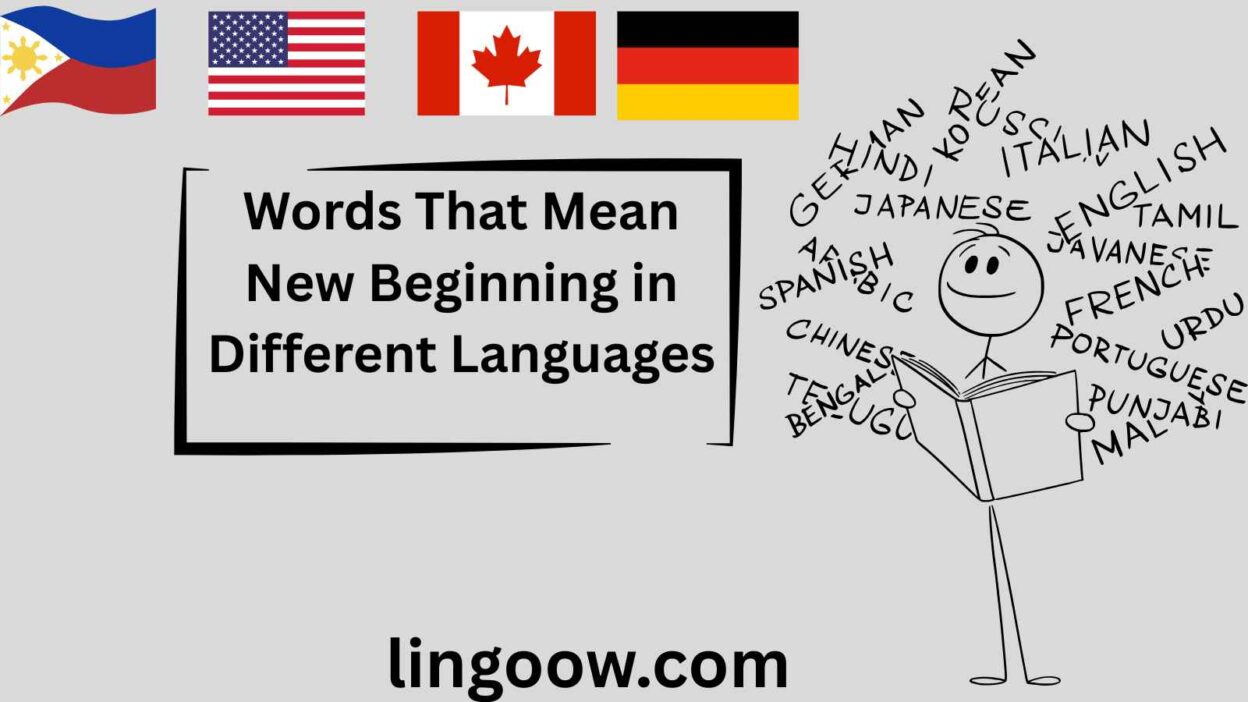Introduction: The Universal Hope of New Beginnings
There’s something magical about the idea of a new beginning. I remember standing at the edge of a new year, watching fireworks burst over a quiet town, feeling that electric mix of hope and possibility. It’s a feeling that transcends borders, a universal human experience that whispers, “You can start again.” Across the world, cultures and languages have crafted unique words and phrases to capture this sense of renewal, each carrying the weight of their traditions, histories, and dreams. Whether it’s the dawn of a new day, a fresh chapter in life, or a collective celebration of rebirth, the concept of a new beginning binds us all. In this journey through languages and cultures, we’ll explore how this powerful idea is expressed globally, revealing both our differences and our shared humanity.
Reference Table: Words for New Beginning
Below is a table showcasing how “new beginning” is expressed in various languages, along with brief cultural or linguistic insights.
| Language | Word/Phrase for New Beginning | Cultural/Linguistic Insight |
|---|---|---|
| French | Nouveau départ | Evokes a fresh start, often tied to personal reinvention in French literature and philosophy. |
| Spanish | Nuevo comienzo | Common in Latin American cultures, symbolizing hope after challenges, like post-revolution eras. |
| Italian | Nuovo inizio | Reflects Italy’s love for renewal, seen in seasonal festivals like Carnevale. |
| German | Neuanfang | A pragmatic term, often used in contexts of rebuilding, like post-war Germany. |
| Mandarin | 新开始 (Xīn kāishǐ) | Rooted in cyclical views of time, tied to lunar new year celebrations. |
| Hindi | नई शुरुआत (Nayi shuruaat) | Associated with spiritual renewal, often linked to festivals like Diwali. |
| Japanese | 新しい始まり (Atarashii hajimari) | Emphasizes harmony and fresh starts, as in spring cherry blossom traditions. |
| Korean | 새 출발 (Sae chulbal) | Reflects optimism and forward momentum, often used in personal and professional contexts. |
| Arabic | بداية جديدة (Bidayah jadidah) | Common across 20+ Arab nations, tied to Islamic concepts of renewal through faith. |
| Swahili | Mwanzo mpya | Used in East Africa, symbolizing community rebuilding and hope after hardship. |
| Zulu | Isiqalo esisha | Reflects resilience in South African culture, often tied to post-apartheid optimism. |
| Yoruba | Ibẹrẹ tuntun | Linked to spiritual rebirth in Nigerian traditions, often celebrated in ceremonies. |
| Maori | Tīmatanga hou | Represents renewal in New Zealand, tied to nature and ancestral cycles. |
| Hawaiian | Hoʻomaka hou | Symbolizes a fresh start, often connected to Polynesian navigation and new journeys. |
| Cherokee | ᎢᏤᎯ ᎤᎵᏍᏗ (Itsehi ulisdi) | Rooted in Native American views of cyclical time and harmony with nature. |
| Samoan | Toe amataga | Reflects Pacific Islander emphasis on community and new ventures, like voyaging. |
European Languages: A Tapestry of Renewal
In Europe, the concept of a new beginning carries nuances shaped by history, philosophy, and cultural rebirth. In French, nouveau départ is more than a phrase—it’s a call to reinvent oneself, often seen in existentialist writings or the romantic notion of starting anew in Paris. The French cherish personal transformation, whether it’s a new career or a fresh love story.
Spanish speakers across Spain and Latin America use nuevo comienzo to mark moments of hope after adversity. In countries like Mexico or Argentina, this phrase resonates in stories of communities rebuilding after political or economic turmoil, reflecting a collective resilience.
In Italian, nuovo inizio carries a festive air, tied to cultural events like Carnevale, where masks symbolize shedding old identities for new ones. Italians view beginnings as opportunities for joy and creativity, mirrored in their vibrant art and cuisine.
German Neuanfang is grounded in practicality, often associated with Germany’s post-war reconstruction or personal milestones like starting a new job. It’s a word that embodies determination and structure, reflecting the German value of order.
Across Europe, these terms highlight a shared optimism, tempered by each culture’s unique lens—whether it’s philosophical, communal, or pragmatic.
Asian Languages: Diverse Expressions of Renewal
Asia’s vast linguistic diversity offers a rich tapestry of words for new beginnings, shaped by ancient philosophies and modern aspirations. In Mandarin, xīn kāishǐ (新开始) is deeply tied to the Lunar New Year, a time when millions across China and beyond clean their homes, settle debts, and embrace renewal. The cyclical nature of time in Chinese culture makes this phrase a symbol of harmony with nature’s rhythms.
In Hindi, nayi shuruaat (नई शुरुआत) resonates in India’s spiritual heart, often linked to festivals like Diwali, the festival of lights, where new beginnings are celebrated with lamps symbolizing hope over darkness. This phrase is personal yet universal, used for everything from marriages to new ventures.
Japanese atarashii hajimari (新しい始まり) reflects a culture that reveres seasonal transitions, like cherry blossom festivals signaling spring’s renewal. The phrase carries a gentle, poetic quality, emphasizing balance and new possibilities.
In Korean, sae chulbal (새 출발) is a dynamic term, used for personal milestones like graduations or professional leaps. South Korea’s fast-paced society imbues this phrase with forward momentum, reflecting optimism and ambition.
Arabic bidayah jadidah (بداية جديدة) is shared across over 20 Arab nations, from Morocco to Iraq. Rooted in Islamic teachings, it often signifies spiritual renewal, such as starting anew after Ramadan. The phrase’s versatility allows it to fit both personal and communal contexts, reflecting the region’s emphasis on faith and community.
African Languages: Resilience and Community
Africa’s linguistic diversity shines in its expressions of new beginnings, often tied to resilience and collective hope. In Swahili, spoken across East African nations like Kenya and Tanzania, mwanzo mpya reflects community-driven renewal. It’s used in contexts like rebuilding after conflict or celebrating new harvests, emphasizing togetherness.
Zulu isiqalo esisha, prevalent in South Africa, carries the weight of post-apartheid optimism. It’s a phrase of triumph, used in personal stories of overcoming hardship or in national narratives of reconciliation and growth.
In Yoruba, spoken in Nigeria and beyond, ibẹrẹ tuntun is steeped in spiritual significance. Yoruba traditions often tie new beginnings to ceremonies honoring ancestors or deities, reflecting a belief that renewal is both personal and cosmic.
Across Africa’s 20+ nations where these languages are spoken, the concept of a new beginning is a beacon of hope, often born from adversity and grounded in community strength.
Indigenous & Island Languages: Rooted in Nature and Journey
Indigenous and island languages offer profound perspectives on new beginnings, often tied to nature and ancestral wisdom. In Maori, tīmatanga hou in New Zealand symbolizes renewal through connection to land and ancestors. It’s used in rituals like the Matariki festival, marking the Maori New Year.
Hawaiian hoʻomaka hou reflects Polynesian values of exploration and resilience, evoking images of navigators setting sail for new horizons. It’s a phrase of adventure and hope, tied to Hawaii’s oceanic heritage.
In Cherokee, itsehi ulisdi (ᎢᏤᎯ ᎤᎵᏍᏗ) speaks to cyclical time and harmony with nature, a core belief in Native American cultures. New beginnings are seen as part of life’s natural rhythm, celebrated in seasonal ceremonies.
Samoan toe amataga, used across Pacific Island nations, emphasizes community and new ventures, like launching a canoe or starting a family. It reflects the interconnectedness of Pacific Islander life.
These languages, spoken in over 20 countries, highlight how new beginnings are deeply tied to nature, ancestry, and collective journeys.
Cultural Insights: The Evolution of New Beginnings
The concept of a new beginning has evolved across civilizations, shaped by religion, history, and tradition. In ancient Mesopotamia, new beginnings were tied to the Akitu festival, a celebration of spring and renewal. In Hinduism, the concept is woven into samsara, the cycle of rebirth, where each life is a fresh start. Islamic cultures view new beginnings through the lens of tawbah (repentance), a spiritual reset that aligns with divine mercy.
Historically, words for new beginnings often emerged from pivotal moments—post-war rebuilding in Europe, independence movements in Africa, or seasonal cycles in indigenous cultures. These terms carry the weight of survival, hope, and transformation, reflecting how societies have navigated change over millennia.
Proverbs: Wisdom in Words
Proverbs about new beginnings offer timeless wisdom across cultures:
- Chinese: “A journey of a thousand miles begins with a single step.” (Emphasizes the importance of starting, no matter how small.)
- Yoruba: “When the new day dawns, the old day is forgotten.” (Highlights moving forward without clinging to the past.)
- Spanish: “A new broom sweeps clean.” (Reflects the fresh perspective a new start brings.)
- Maori: “Turn your face to the sun, and the shadows fall behind you.” (Encourages embracing new possibilities.)
- Arabic: “Every sunrise is a new page in the book of life.” (Ties renewal to daily opportunities.)
These sayings remind us that new beginnings are both universal and deeply personal, offering hope and direction.
FAQs: Unraveling New Beginnings
Why do words for new beginning sound similar in many languages?
Many languages share roots due to historical linguistic families (e.g., Indo-European languages like French and Spanish). Additionally, trade, conquest, and cultural exchange have spread similar concepts, leading to parallel expressions.
What’s the oldest known usage of a word for new beginning?
While exact origins are hard to pinpoint, ancient Sumerian texts (circa 3000 BCE) used terms for renewal tied to agricultural cycles, among the earliest recorded expressions of new beginnings.
How do cultural differences shape the expression of new beginnings?
Cultures with cyclical views of time (e.g., Chinese, Maori) tie new beginnings to nature, while linear-time cultures (e.g., Western European) often focus on personal or historical milestones. Spiritual contexts, like in Arabic or Yoruba, emphasize divine or ancestral roles in renewal.
Conclusion: The Power of Starting Anew
The words we use for new beginnings—whether nouveau départ, xīn kāishǐ, or mwanzo mpya—carry the heartbeat of human hope. Across continents and cultures, they reflect our shared desire to move forward, to heal, to grow. Each language adds its own color to this universal canvas, reminding us that while our stories differ, our longing for renewal unites us. What does a new beginning mean to you? How do you say it in your language, and what stories does it hold? Share your thoughts in the comments below, and let’s celebrate the beauty of starting anew, together.




